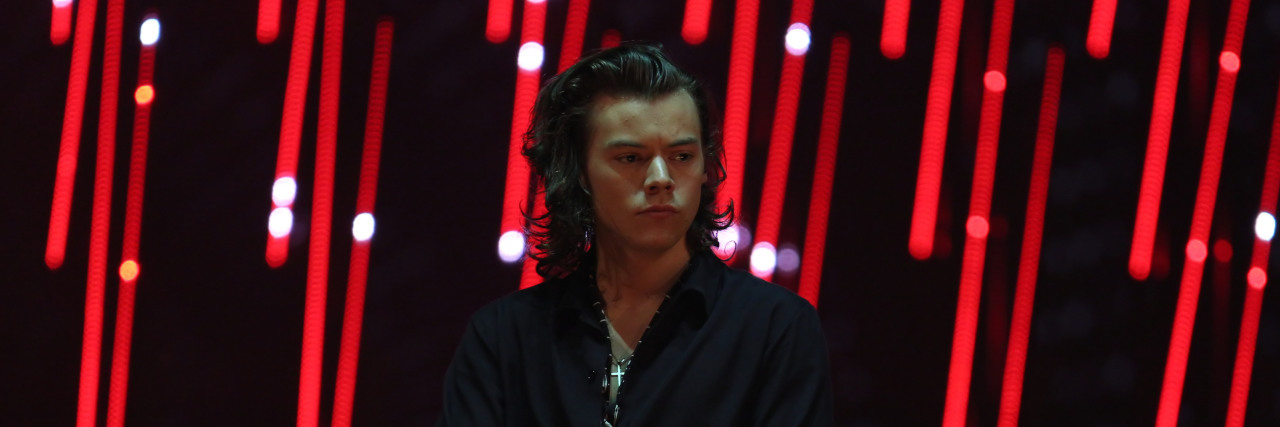Harry Styles’ Merchandise Backlash Highlights a Trigger for Eating Disorders
Sometimes the news isn’t as straightforward as it’s made to seem. Danielle Lowe, The Mighty’s Mental Health Intern, explains what to keep in mind if you see this topic or similar stories in your newsfeed. This is The Mighty Takeaway.
On Tuesday night, Harry Styles began his headlining tour in San Francisco, and while fans were excited about the concert, many were outraged by the size discrimination at the merchandise table. Styles’ tour shirts in sizes L, XL and XXL were being sold for $5 more than the smaller sizes.
Charging higher prices for larger clothing, sometimes known as a “fat tax,” is a complex issue and not exclusive to a Harry Styles concert. Many in the fashion industry, as well as consumers, have written about why stores may charge more for, or not carry larger sizes at all. This is all worthy of discussion, but I want to talk about a factor I haven’t seen brought up online: how charging more for larger sizes could affect someone with an eating disorder or someone in ED recovery, like I am.
I believe price differences like this create a potential breeding ground for people with eating disorders, no matter the size of their body. This is particularly relevant when you consider that many of Styles’ fans are teenagers. According to the National Eating Disorders Association (NEDA), “35-57% of adolescent girls engage in crash dieting, fasting, self-induced vomiting, diet pills, or laxatives. Overweight girls are more likely than normal weight girls to engage in such extreme dieting.”
Despite the stereotype that you have to be emaciated to have an eating disorder, many women with larger bodies struggle with EDs and have the added challenge of forcing treatment providers to legitimize their disorder. They’re turned away from getting help or too stigmatized to ask for it at all. Society has already made it hard enough many of us to feel validated in our illnesses — we don’t need to make it worse by fat-shaming at a Harry Styles concert.
Harry’s merchandise for tonight’s show . Beautiful! #harrystyles #onedirection pic.twitter.com/wpKJtRJ9YV
— NoneLikeOneDirection (@Nonelike1D5678) September 20, 2017
If I was still in my eating disorder, this price difference would have added some fuel to the eating disorder “fire.” In the midst of it, my eating disorder would do anything to push me to engage in unhealthy behaviors. Seeing a price hike in the larger sizes could definitely have sent me into an eating disorder thought spiral.
“You have to engage in behaviors, otherwise you’re going to have to start paying more money for clothing and you’ll go broke.”
“See? The world is now charging you more as a bigger person. Better watch out.”
“This just shows people love thinner people more. I was right. And you want people to like you, right?”
It goes on.
Yes, these are all irrational, disordered thoughts. But we know how eating disorders love to latch on to anything.
While I don’t have an answer for how the fashion industry should address this pricing issue, as someone in the eating disorder community, I believe the damage these thoughts can do costs you more than a few extra dollars on a clothing item that fits your healthy body. Needing more therapy sessions or going to a treatment center would cost a lot more than a few extra dollars. It’s more worthwhile to focus your energy on self-acceptance and body gratitude. This did me wonders in the long run.
The clothing industry does not get to control how we think of our bodies; we do. If you’ve been excited about this concert for months, don’t let your eating disorder ruin the experience. Be at the concert. Live your life for the experiences, not the sizes you hold in your closet. No matter what the size on the label is, Harry’s shirts say, “Treat everyone with kindness,” and you are no exception.
Update: Since Tuesday’s show, Live Nation released a statement on this issue: “There was a mistake in size pricing at [Wednesday] night’s show… Harry and his team were unaware and this has now been rectified.”
If you or someone you know is struggling with an eating disorder, you can call the National Eating Disorders Association Helpline at 1-800-931-2237.
We want to hear your story. Become a Mighty contributor here.
Image via Wikimedia Commons/Kurt Kulac

